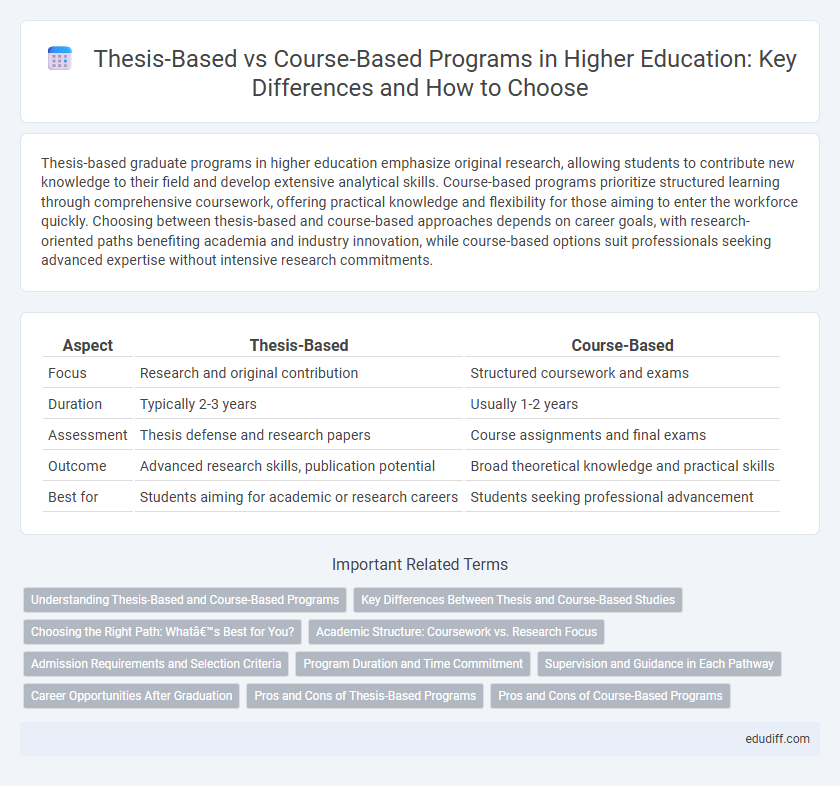Thesis-based graduate programs in higher education emphasize original research, allowing students to contribute new knowledge to their field and develop extensive analytical skills. Course-based programs prioritize structured learning through comprehensive coursework, offering practical knowledge and flexibility for those aiming to enter the workforce quickly. Choosing between thesis-based and course-based approaches depends on career goals, with research-oriented paths benefiting academia and industry innovation, while course-based options suit professionals seeking advanced expertise without intensive research commitments.
Table of Comparison
| Aspect | Thesis-Based | Course-Based |
|---|---|---|
| Focus | Research and original contribution | Structured coursework and exams |
| Duration | Typically 2-3 years | Usually 1-2 years |
| Assessment | Thesis defense and research papers | Course assignments and final exams |
| Outcome | Advanced research skills, publication potential | Broad theoretical knowledge and practical skills |
| Best for | Students aiming for academic or research careers | Students seeking professional advancement |
Understanding Thesis-Based and Course-Based Programs
Thesis-based programs emphasize independent research, allowing students to develop critical analytical skills and contribute original knowledge to their field, often requiring a comprehensive written thesis. Course-based programs focus on structured coursework, offering a broad understanding of the subject through diverse classes and practical assignments, ideal for those seeking professional skills. Understanding the distinct learning outcomes and career pathways of thesis-based versus course-based programs helps students select the best approach for their academic and professional goals.
Key Differences Between Thesis and Course-Based Studies
Thesis-based studies emphasize original research, requiring students to formulate a research question, conduct in-depth analysis, and present their findings in a comprehensive thesis document. Course-based programs focus on structured learning through lectures, exams, and assignments, offering a broader overview of the subject without the necessity of producing original research. Key differences include the depth of subject exploration, the emphasis on research skills versus coursework, and the time commitment, with thesis-based programs typically demanding more extensive independent work.
Choosing the Right Path: What’s Best for You?
Choosing between thesis-based and course-based graduate programs depends on your career goals and learning style. Thesis-based programs emphasize original research and develop critical thinking, ideal for those pursuing academic or research careers. Course-based programs focus on practical knowledge and professional skills, making them suitable for students aiming to enter the workforce quickly or advance in specific industries.
Academic Structure: Coursework vs. Research Focus
Thesis-based programs emphasize extensive research, requiring students to conduct original studies and produce a comprehensive thesis, which fosters advanced analytical and critical thinking skills. Course-based programs prioritize structured coursework, featuring a diverse range of classes designed to enhance theoretical knowledge and practical skills without the necessity of a formal research project. The academic structure of thesis-based programs is heavily anchored in research methodology and data analysis, whereas course-based programs focus on a flexible curriculum tailored to professional development and applied learning.
Admission Requirements and Selection Criteria
Thesis-based programs typically require a strong research background, including prior publications and a detailed research proposal, reflecting a selection emphasis on academic achievements and research potential. Course-based programs prioritize a solid undergraduate GPA and relevant coursework, focusing on practical knowledge and professional experience during admission. Both program types may require letters of recommendation and standardized test scores, but thesis-based admission favors demonstrated research aptitude.
Program Duration and Time Commitment
Thesis-based programs typically require 2 to 3 years to complete, emphasizing original research and extensive time commitment for data collection and writing. Course-based programs generally take 1 to 2 years, focusing on structured coursework and shorter time commitments with fewer research obligations. Students pursuing thesis-based degrees invest more hours weekly in independent study and laboratory work compared to the more scheduled and classroom-oriented course-based programs.
Supervision and Guidance in Each Pathway
Thesis-based programs offer intensive one-on-one supervision, allowing students to develop specialized research skills under direct mentorship from faculty experts, fostering deep academic growth. Course-based programs provide structured guidance through a series of taught modules, emphasizing comprehensive knowledge acquisition and practical application, with faculty support tailored to coursework and project assessments. Each pathway's supervision style caters to distinct learning preferences, with thesis-based favoring autonomous research development and course-based focusing on guided learning and skill-building.
Career Opportunities After Graduation
Thesis-based programs develop strong research, analytical, and writing skills highly valued in academia, research institutions, and specialized industry roles, often leading to careers as researchers, professors, or policy analysts. Course-based programs emphasize practical knowledge and professional skills, making graduates well-suited for immediate employment in corporate sectors, government agencies, and non-profit organizations. Choosing between thesis-based and course-based pathways impacts career trajectories, with thesis degrees favoring research-intensive roles and course-based qualifications aligning with applied, hands-on careers.
Pros and Cons of Thesis-Based Programs
Thesis-based programs offer in-depth research experience, fostering critical thinking and specialized expertise essential for academic and professional advancement. However, they demand significant time investment and self-motivation, often leading to longer program durations compared to course-based alternatives. While thesis programs enhance skills in data analysis and academic writing, they may pose challenges for students seeking a broader, coursework-focused education with immediate practical application.
Pros and Cons of Course-Based Programs
Course-based programs offer a structured curriculum with diverse coursework, promoting broader knowledge acquisition and practical skills development ideal for professional careers. These programs typically have shorter completion times and flexible scheduling, accommodating working students and those seeking immediate career advancement. However, course-based programs may lack the intensive research experience and specialized focus found in thesis-based study, potentially limiting opportunities for academic or research-oriented careers.
Thesis-based vs Course-based Infographic

 edudiff.com
edudiff.com